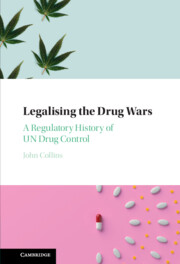Book contents
- Legalising the Drug Wars
- Legalising the Drug Wars
- Copyright page
- Dedication
- Contents
- Acknowledgements
- Abbreviations
- Historical Overview: The International Drug Control System
- Introduction
- 1 Drug Diplomacy from the Opium Wars through the League of Nations, 1839–1939
- 2 International Drug Control in Wartime, 1939–1945
- 3 Creating the UN Commission on Narcotic Drugs, 1945–1946
- 4 Reconstructing Drug Control in Europe, Asia and the Middle East
- 5 Old Battles Anew at the UN Commission on Narcotic Drugs, 1946–1948
- 6 Dividing Up the Global Licit Market, 1948–1953
- 7 From the 1953 Protocol to the 1961 Single Convention
- 8 Assessing the Legal Legacy of the Single Convention
- 9 Conclusion: UN Drug Control in the Twenty-First Century
- Notes
- Bibliography
- Index
8 - Assessing the Legal Legacy of the Single Convention
Published online by Cambridge University Press: 25 November 2021
- Legalising the Drug Wars
- Legalising the Drug Wars
- Copyright page
- Dedication
- Contents
- Acknowledgements
- Abbreviations
- Historical Overview: The International Drug Control System
- Introduction
- 1 Drug Diplomacy from the Opium Wars through the League of Nations, 1839–1939
- 2 International Drug Control in Wartime, 1939–1945
- 3 Creating the UN Commission on Narcotic Drugs, 1945–1946
- 4 Reconstructing Drug Control in Europe, Asia and the Middle East
- 5 Old Battles Anew at the UN Commission on Narcotic Drugs, 1946–1948
- 6 Dividing Up the Global Licit Market, 1948–1953
- 7 From the 1953 Protocol to the 1961 Single Convention
- 8 Assessing the Legal Legacy of the Single Convention
- 9 Conclusion: UN Drug Control in the Twenty-First Century
- Notes
- Bibliography
- Index
Summary
This chapter examines the legal legal of the Single Convention and its successor treaties. The passage of the Single Convention represented a high-water mark in the international regulatory system. While it contained little in terms of innovation, it streamlined the complex array of drug treaties, while moving the terrain of control forward marginally. It essentially solidified an economic regulatory framework for a global licit commodity market in certain essential medicines. To enforce this market it mandated certain action around controlling and prohibiting non-medical production and manufacturing. Key questions around dealing with ‘addiction’ and suppressing non-medical consumption were left largely unanswered. The US may have lost the battle around the Single Convention and control of the system in the 1960s but they would enter the 1970s ready to refight many of these battles, beginning with the declaration of the ‘war of drugs’ and an aggressive new round of bilateral drug diplomacy. Ultimately the ‘war on drugs’ was not an inevitable outgrowth of these documents, but instead represented a specific set of interpretations, bureaucratic and normative trajectories and member state implementations.
Keywords
- Type
- Chapter
- Information
- Legalising the Drug WarsA Regulatory History of UN Drug Control, pp. 189 - 203Publisher: Cambridge University PressPrint publication year: 2021

